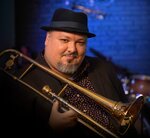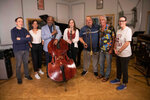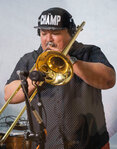


How hot is Michael Dease?
The MSU jazz trombone professor with the frictionless, ductile tone, rippling rhythmic drive and unquenchable zest for life is at the very top of his game.
“The Other Shoe,” Dease’s deep-diving 2023 album of twisty tunes by Lansing composer and jazz patron Gregg Hill, is garnering rave reviews and topping national jazz charts. His previous CD, “Best Next Thing,” did the same.
Surpassing many of his own teachers, mentors and role models, Dease, who is only 40, earned the coveted DownBeat Critics’ Poll award in trombone two years in a row, in 2021 and 2022.
In short, Dease is everywhere these days, and where he can’t be, his students are. To put a cherry on a hot fudge sundae of a year, the Jazz Education Network named Dease Jazz Educator of the Year in 2023.
“I didn’t predict this would happen,” Dease modestly demurred. “I just try to keep my head down and play.”
Dease will bring a youthful quartet to East Lansing’s Summer Solstice Jazz Festival 7:30 p.m June 24 to join a three-part celebration of Hill’s music.
Guitarist Randy Napoleon will precede Dease at 4:30; bassist and MSU Jazz Studies director Rodney Whitaker will follow Dease at 9 p.m.
The festival three-fer will highlight the thwacking creative punch Lansing and MSU have delivered to the national jazz scene in recent years. Napoleon, Dease and Whitaker have all scored big recently with albums of Hill’s music. Dease is planning to record a second round of Hill’s tunes this summer.
In the past few years, Hill has emerged from his behind-the-scenes role as jazz patron and supporter to serve as a fount of inspiration and local muse for Lansing’s line-up of national jazz stars.
The national press has taken notice. Reviewer Jerome Wilson of AllAboutJazz magazine deemed “The Other Shoe” one of the best albums of the year, and enthused over Hill’s “fascinating writing, brought to life beautifully by Michael Dease’s arrangements.”
“He is really good at writing — I call them short stories,” Dease said. “He’s not just writing straight-ahead bebop, New Orleans groove or whatever.”
The album ventures all over the map, from the spiritual simplicity of “The Classic” to the absorbing, multi-part “Scooter’s Dream” to the 15-minute, electrified brew of the title track, “The Other Shoe.”
Hill gave Dease free rein to arrange the music as he saw fit.
“I got to try every musical trick I wanted,” Dease said. “I tried to color inside the lines, but he let me use every medium — acrylics, water color, crayon, pastels. It’s the first time I’d done that with somebody else’s compositions.”
A jazz lover from early youth, Hill is largely self-taught as a composer. He bounced around the country for 25 years as a truck driver, soaking up the jazz scenes in New York, California and Detroit, before settling in Lansing.
Rather than checking an academic or commercial box, Hill’s tunes conjure specific moods and places and always pack harmonic, stylistic or rhythmic surprises.
In the studio, Dease leaned in to Hill’s outsider perspective to keep the music fresh.
“I deliberately didn’t over-rehearse,” he said. “The band kept telling me, ‘Can we see some music?’ and I said ‘No, I want the magic.”
A year earlier, Whitaker did the same thing to Dease, when they recorded another album of Gregg Hill tunes, “Outrospection.”
When Whitaker declined to share the music, Dease respectfully objected, explaining that he couldn’t “get to 100 percent” without it.
Whitaker flatly refused, saying, “No, man, you’re Mike Dease.” The spare duet of Dease and pianist Xavier Davis floated up like a fine, free balloon and made a perfect intro to the album.
“It was a hell of a vote of confidence,” Dease said. “After that, I didn’t feel like I had given enough respect to the moment.”
Dease paid the compliment forward to the varied group of musicians he assembled on “The Other Shoe,” including brilliant veteran pianist Geoffrey Keezer and lyrical young clarinetist Virginia MacDonald. The result is the first album in Dease’s career that he’s comfortable listening to on “repeat.”
In the second half of Hill’s multi-part “Scooter’s Dream,” Dease and MacDonald break into a sudden chase that surges with a breathless sense of play, one of many such moments on the album.
“When I listen to it I hear a lot of adrenaline,” he said. “It’s the exciting part of jazz we love. You get the best of both worlds. You get the hours of practice, the tone, the listening, and you also get the moment and the creativity.”
Dease doesn’t talk much about his own playing.
To trick him into it, you have to ask him to describe the tone of one of his trombone idols, Curtis Fuller.
“It’s round and warm but there’s passion and articulation and it’s really swinging and the harmony is so clear and it feels so good,” he said.
Mission accomplished.
Now that Dease’s skills are universally acknowledged in the jazz world, he’s left youthful showboating behind to reach a new phase of confidence and insight, judging by his warm, spacious solo on “The Sleeper” and eloquent restraint on “Shorty’s Tune.”
“Trying to prove something is very, very low on my priority list these days,” he said.
His solo chorus on “Goodbye Blues” is imbued with a glow that recalls a well-aged wine.
“Twenty years ago, I would have thought of all these chord sequences I could have used, or how many different combinations of rhythms,” he said. “Now I’m thinking about, how does this moment feel? What colors are we dealing with? Blacks, browns, green, violet? It’s so freeing to play with just an emotional sensibility.”
It takes a tricky combination of concentration and calm to block out the multiple monitors constantly running in a musician’s head.
“Do all of my notes need to have the same articulation, consistency, clarity? Does this register need to have the same tone? It’s so nice to just turn all that shit off for a second.”
The trickiest thing in Dease’s life these days is balancing music, teaching and his precious family life with his wife, MSU percussion Professor Gwendolyn Dease, and their two daughters, Brooklyn and Charly. (Dease has described his romance with Gwen “some otherworldly shit.”)
As soon as the academic year at MSU ended earlier month, Dease headed back to the Brevard Music Center in North Carolina, where he directs the Summer Jazz Institute.
“Balance is the thing right now,” he said. “I’ve been trying to streamline things as much as possible. When I teach, I get as much done as I can. When I play, it’s playing where I need to play, so I can be available for my family. Many of my musician friends and heroes struggle with that balance and I struggle with it too.
It’s kicking my butt, but I’m working on it.”
His Holy Grail is to find moments where creativity, music and family come together.
He hit the jackpot when his 7-year-old daughter, Brooklyn, played “auxiliary percussion” with his sextet recently in Detroit, after another member of the sextet missed a flight.
“She got up on stage for both sets and played,” Dease said. “I was like, ‘Man, I think I found the formula here.’”
It’s clear where Dease’s priorities lie.
He’s long since proven that he can inhabit any jazz room he wants to. By now, he’s played with a panoply of jazz greats, from trumpeters Roy Hargrove and Nicholas Payton to bassist Christian McBride, the Jazz at Lincoln Center Orchestra and the Dizzy Gillespie All-Star Big Band. He plays on the regular with saxophonist David Sanborn.
But he’s most passionate about opening doors for the younger generation of jazz musicians.
“When you open up the scene, share the bandstand and spread the love, man, it makes the music better,” he said.
Hot as he is, Dease goes supernova when he talks about promising young players like the quintet he brought to the Detroit Jazz Festival last fall.
“Man, that band was cooking,” Dease said. Other than Dease and pianist Keezer, it was everyone’s first time playing the festival.
Dease will do the same at the East Lansing Summer Solstice gig, featuring New York’s Gary Kerkezou, “a smoking, up and coming drummer, and she’s only 26.”
“We just played some of Gregg’s tunes in New York,” he said. “It was happening, man.”
Poly-stylistic young MSU student and “very colorful character” Rueben Stump will handle the bass. St. Louis-based Wyatt Forhan, who has studied trombone with Dease for 10 years, will play on piano. “It’s a very crazy twist,” Dease said. “He’s an amazing trombonist, but equally amazing piano player.”
Forhan sat in at Dease’s recent gig at the Blue Llama Jazz Club in Ann Arbor.
Dease broke into a broad grin at the memory.
“He stole the show,” Dease said. “Everybody freaked out.”
Support City Pulse - Donate Today!
Comments
No comments on this item Please log in to comment by clicking here